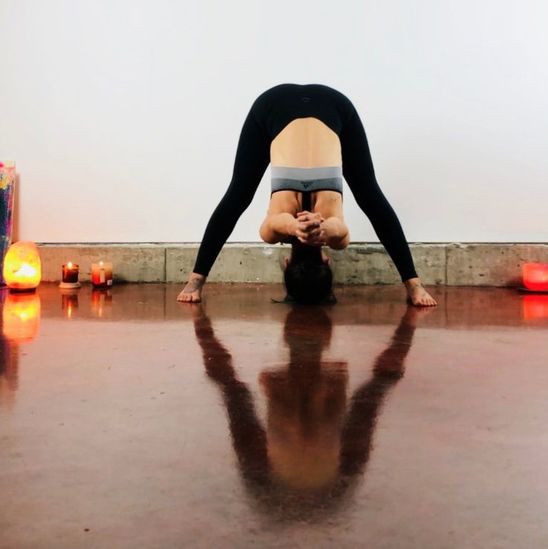|
*unfortunately, post sequence is out of order for days 6 and 7 of this series - scroll down for Day 7, an exploration of Sutras 1.17 - 1.22* For Day 6 of the Purple Valley Yoga Challenge, we further explore the concept of non-attachment in Patanjali's Yoga Sutras (15 and 16 of Chapter 1, portion on contemplation), along with asana Prasarita Padottansana C.
Sutra 1.15: Drstānusvravika visaya vitrsnasya vasikāra samjna vairāgyam ~ "The consciousness of self-mastery in one who is free from craving from objects seen or heard about is non-attachment." (*translation by Sri Swami Satchidananda) I was listening to an online talk about non-attachment with Sadhguru recently, and I loved his explanation of the connectedness that can be found through this practice, rather than dullness or apathy, which people often assume will be the result: "Being transparent does not mean you are colourless - to be transparent means you are capable of any colour, but nothing sticks to you. If one is transparent, have they given up something? Or are they willing to include everything?" In his commentary on this sutra, Sri Swami Satchidanada says that serving others from a selfless place helps us to cultivate and maintain our own peace. In this way, he says we're giving into the desire to elevate our consciousness, though he also calls our personal peace "the most important sacred property". Sutra 1.16: Tat param Purusa khyāter gunavaitrsnyam ~ "When there is non-thirst for even the gunas (constituents of Nature) due to the realization of the Purusa (True Self), that is supreme non-attachment." I found this translation a bit confusing, but Sri Swami Satchidananda's commentary was insightful and helpful in decoding this sutra (as always). He explains that while samskaras remain, and while we are working on stilling the mind, one might get a sense of peace and bliss, but not yet the greatest joy of resting in the True Self. He adds that we continue to meditate and practice yoga if we have experienced this pure bliss, even if only for a moment, because we simply don't know of anything that could be more fulfilling.
0 Comments
Your comment will be posted after it is approved.
Leave a Reply. |

